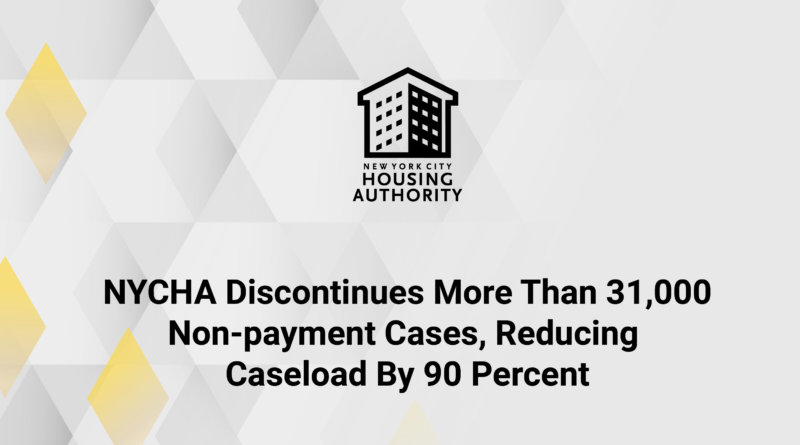NYCHA Discontinues Over 31,000 Non-Payment Cases, Reducing Caseload by 90%
On February 3, as part of NYCHA’s effort to re-imagine how it approaches evictions, the Authority announced that 90 percent of the 34,000 rental non-payment cases that existed in housing court as of March 2021 have been resolved without judicial intervention. Moving forward, NYCHA will prioritize cases for accounts that owe significant amounts of arrears that extend past two years. To date, there are 2,300 such accounts comprising an estimated $44 million in past-due rent.
“The pandemic created an opportunity for NYCHA to re-imagine how we prioritize lease enforcement,” said NYCHA Chair & CEO Greg Russ. “The data-driven and customer service-oriented approach reflects the vision we have for bringing sustainable change that positions the Authority for a stronger future and improves the resident experience.”
“We are pleased that NYCHA is making changes to its rent collection practices,” said Lucy Newman, Staff Attorney at The Legal Aid Society. “For too long, public housing residents’ lives have been disrupted – by forcing them to miss work or their children missing school – when NYCHA took them to court and threatened them with eviction from their homes for money they didn’t owe. We hope to see more changes as part of NYCHA’s Transformation Plan that will lead to a better quality of life for residents and ensure the safe, secure homes to which public housing residents are entitled.”
“Discontinuing eviction cases in the middle of a pandemic is a critically important step that demonstrates just how valuable a robust public housing authority is to the health, safety, and stability of all New York residents,” said Cea Weaver, Campaign Coordinator at Housing Justice for All. “NYCHA is unique and this shows how the public sector can and will step up where the private sector fails. NYCHA must be fully funded to meet its mission of providing housing to all who need it.”
NYCHA collected $898 million in rent in 2021 and $964 million in rent in 2020, down from $1.05 billion in 2019. That is a 15 percent decline in rent collection from 2019 to 2021.
The decision to focus on high-dollar and long-term delinquent accounts represents a strategic shift outlined in NYCHA’s Transformation Plan. The eviction moratorium allowed the Authority to prioritize a data-driven approach to lease enforcement actions capable of optimizing this key operational process.
In addition to ensuring uniformity across the Authority in how such cases are handled, the move will enable front-line housing assistants and property managers to focus on day-to-day quality-of-life issues affecting residents. The goal of the new approach is to use litigation to address rent arrears as a last resort.
As part of this process, NYCHA also launched a simple consent driven process so NYCHA could apply for the Emergency Rental Assistance Program (ERAP) on behalf of its residents. NYCHA launched a large-scale communications campaign, which included mailings, phone calls, door-knocking campaigns, and e-mail communications, to secure approval for enrollment from residents, and made enhancements to the Authority’s IT system to ensure the process was simple and easy for residents to use. As of January 24, 2022, NYCHA submitted landlord documents for nearly 28,000 ERAP applications on behalf of NYCHA residents, totaling more than $105 million in arrears.
NYCHA is currently not litigating cases against residents with an ERAP application or interim recertification application – and as part of the Transformation Plan effort, NYCHA deprioritized cases where the head of household was over 62 years of age. Non-payment rental cases were discontinued where the household had no arrears or only arrears that accrued during the pandemic. NYCHA also discontinued cases if a household had multiple cases filed against it, keeping only the most recent case.
During the pandemic, NYCHA worked to alleviate the financial burden for households that were impacted by additional expenses and/or loss of income by making it easier for residents to apply for the Authority’s rental hardship program, working with HUD to grant a waiver allowing families to self-certify income loss and streamlining the interim recertification process that fixes rent to 30 percent of monthly adjusted income.
The Authority is coordinating with HRA to support residents receiving welfare assistance or that have dual-income earners – and will roll out enhanced payment plans to stabilize delinquent rental arrears accounts. NYCHA has also worked to empower property managers who are most familiar with seriously delinquent tenants, through Authority-wide guidance on how to work with housing attorneys, make referrals to social service providers, and review the priority list to identify and address severe outstanding repairs.
In enacting these policies, NYCHA will continue to work with residents via the Resident Roundtable to make sure their lease enforcement related priorities are reflected.







